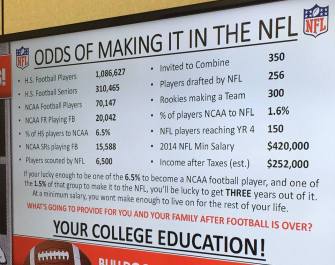Draft Day.
You get drafted, you sign a contract, and you get started on something not many people can comprehend. You can’t even really comprehend it.
Friend/Random Person: “Hey, I see the Cardinals are on ESPN tonight – are you playing?”
Me: “Yes, I am playing tonight… but not on ESPN, and not in front of 50,000 fans… I’ll be playing in a tiny town in the middle of Iowa, in front of maybe 150 fans if we’re lucky, with no TV coverage, and after I eat my third peanut butter and jelly sandwich of the day.”
Okay, let’s back up. I can’t deny that being drafted is one of the best days of your life and that the opportunity you’ve been given is absurdly rewarding. However, it is your welcoming to the real world, and time to get to work. Once you’re given that team uniform, you’ve officially been invited on an adventure where you actually get to play out the dream you’ve been chasing since you were a kid. You instantly get chills. What most people do not understand, though – and what many don’t even know about – is that there is such thing as the Minor Leagues – the pit-stop before the Majors.
Scratch that – it’s no pit-stop – it’s many stops (some exceptions) before the Majors. There are many different levels of the Minors, each with its own challenges and struggles. The Minor Leagues are a physically-demanding, thought-provoking, and sometimes grueling but an always unique experience all at once. The Minors are humbling; indeed, they are where you earn the right to potentially play in the Majors. You have to pay your dues and earn your stripes, just like all the current Major Leaguers had to do before you.
Mike Trout, Clayton Kershaw, and Miguel Cabrera all came up through their respective farm systems and ended up in the Majors. None of them signed their contracts, hopped on a private jet, and met the big league team wherever they were playing that day. They all had to hone their skill sets in order to be able to have a chance to compete and dominate in the Majors.
What many people assume after you sign a contract with a Major League team is that you immediately go and play for that Major League team. In reality, as a new draftee, you sign a Minor League deal with a Major League team. You begin your professional career in either the backfields of your respective organization in the lowest of the Minor Leagues, or if you’re fortunate, in a Minor League stadium somewhere across the United States. (Most, though not all, players begin in rookie ball or A ball). Players coming straight out of high school, like myself, typically begin in the lowest of the levels – which is precisely what I did.
I began my career in the Gulf Coast League in Florida. I signed in mid-June 2013 after being drafted on June 6th of that year, and my career began soon thereafter. After signing, I had to pack all my stuff over a few day span, leave my family and friends and everything I had ever known behind, and head to Jupiter, Florida to begin my dream. I had a general idea of what the Minor Leagues were like, having been friends with a few Minor Leaguers over the years. But stories can give you only so much to imagine, and until you plant your feet in your new life and experience the grind of a Minor League season, you soon realize that no one else’s story could have prepped you for this new exciting, challenging, and sometimes wearisome world.
In my opinion, the Minor Leagues teach you to become a man. As someone who did not attend college, I’m sure college does something similar. The only difference, baseball-wise, may be that when you are playing ball in college, you have weeks off at a time – you have time to go home, and most importantly, you have things to get you away from baseball. You have class, you have a social life, you have friends to take your head away from the game. I’m not saying college is in any sense easy; I’m saying it’s different. (Undoubtedly, taking 15 credits at school while playing a sport can’t be an easy thing to conquer.)
We Minor Leaguers are away for six months straight (some of us may get to go home for two days for the All-Star break). We see our families sparingly, only if we are lucky enough to have them visit. Professional baseball is just that: professional baseball. Baseball quickly becomes all-encompassing – it becomes your job, your education, your socializing, your passion, your struggle, your journey, your triumph – your life. And your teammates… Well, spending days on end with those guys – countless hours on the field, in the dugout, in the gym, in the locker room, in the hotels and apartments, on those unending bus rides through corn fields and nothingness – those guys quickly become like family.
To date, I’ve played at three different levels of the Minor Leagues: the Gulf Coast League (rookie, after draft), the Midwest League (Low-A), and my current post in the Florida State League (High A). All three have been great learning experiences for me. From my hours on the field, I have acquired knowledge, experience, tons of practice, and a much stronger sense of discipline. But I absolutely cannot overlook what I’ve learned from my hours off the field: how to live away from home, how to cope with failure, how to learn from other players and coaches and also from my own mistakes, how to sign my own lease papers and pay my own bills… etc.
The Minor League lifestyle is not an easy one, but it’s what we signed up for when we signed that contract. We signed up for 12-hour bus rides, being away from familiarity, living out of suitcases – just like the MLB players before us did. The guys we all looked up to – the Ken Griffeys, the Cal Ripkens, the Derek Jeters – they all did what we are currently doing. So who are we to complain? The greats had to go through this same exact grind – and if you asked them, I can almost guarantee that each and every one would say he’d do it 100 times over again.
The Minor Leagues have matured me and made me become something more than what I was. I could not be more appreciative of every experience that I’ve had – every roadblock I’ve faced and been coached through, every obstacle my teammates and I have overcome, and every goal we’ve achieved together. I’ve – and we’ve all – come a long.
And at the end of the day, there really is only one thing to do in the Minor Leagues if you’re unhappy: play better.
———————————————————————————————————————-
For anyone interested, here is what a typical day looks like for me, a Minor League pitcher. ( As a kid, I was always curious what a day in the Minors was like, so figured I’d share my experiences)
Sides- 3:00 PM
Stretch- 3:30 PM
Long toss- 3:45 PM
Shag batting practice-4:00-4:45 PM
Out of clubhouse- 6:05 PM
Game- 6:35 PM
Depending on our lifting and conditioning schedule, we will usually head in to lift around 11 or 12, get something to eat, then head back to make it for stretch. One of the unwritten rules of Minor League baseball is to be there an hour before stretch. ( I learned that the hard way in Peoria, IL in my first full season in the Minor Leagues)
Usually the schedule looks something like above, but that is just the mandatory times we must be at the field. Most of us get to the stadium at around 1:30 ( if we don’t have a lift ) and get things done regarding arm care and personal routines to prepare for the night’s game.
After a peanut butter and jelly (Minor League must) or a stadium hot dog, we head out to compete in the game.
When we are on the road, the schedule will be similar, the only difference is the bus will leave our hotel around an hour to and hour and a half before stretch and we will get situated in the visiting clubhouse then complete our day.


